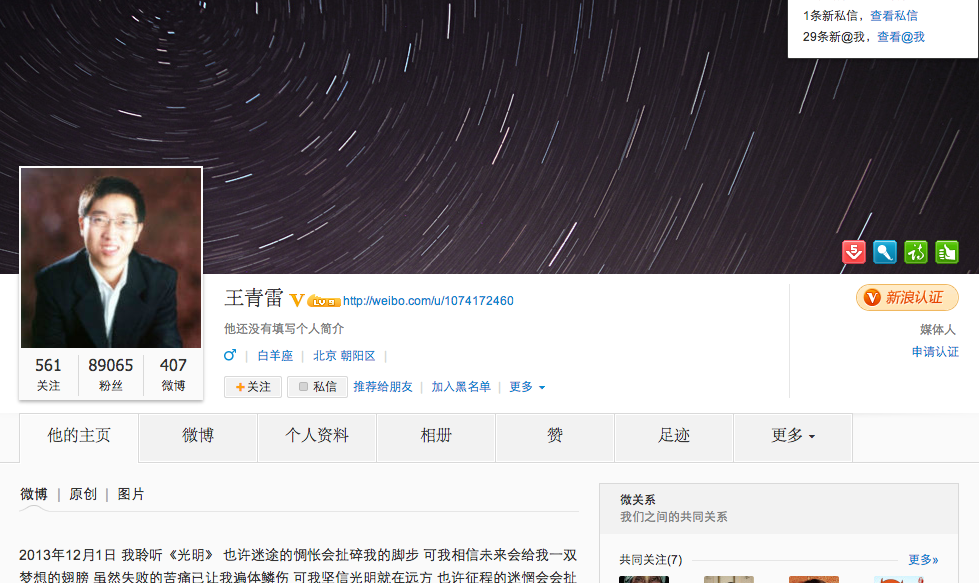Early Monday morning, former CCTV producer Wang Qinglei posted an open letter criticizing the state broadcaster to his Sina Weibo account. Wang had spent 10 years working for CCTV, and was fired on November 27 after posting online comments critical of the network. Reuters reports:
A producer for China’s state broadcaster CCTV said on Monday that he had been fired after he criticized the network’s role in a controversial crackdown on online rumors.
[…] He took issue with China Central Television’s airing of a confession by Chinese-American venture capitalist Charles Xue in which he said he irresponsibly spread gossip online.
[…] CCTV often airs confessions by thieves, prostitutes and other petty criminals, but in recent months, a string of high-profile suspects have confessed to crimes on air, often wearing handcuffs and jumpsuits.
Critics say public confessions deprive the accused of the right to a fair trial.
Wang echoed this criticism in his letter, saying that while fighting legitimate gossip is laudable, the media should not decide who is innocent or guilty. [Source]
Charles Xue’s confession on CCTV came amid an ongoing government crackdown on online rumors, and proved that microbloggers with social capital—also known as “Big V” users—would be primary targets in government efforts to gain influence over online public opinion.
The Wall Street Journal relays the highlights of Wang’s letter, which can be read in its entirety on CDT Chinese [zh]:
[…] Mr. Wang described his disgust at the broadcaster’s reports on Mr. Xue and other influential microbloggers: “We abused the public institution of media to wantonly bombard an individual indiscretion. Journalistic integrity and professionalism were nowhere to be found.”
[..] Elsewhere in the letter, Mr. Wang savages the propaganda system that censors news content. He contrasts CCTV’s shining new office tower and expanded global operations with what he says is the broadcaster’s declining reputation and influence – a trend he attributes to tightened controls.
The voices we hope to broadcast and the attitudes we hope to express have been silenced over and over again. A leader once joked with me: ‘When you’re choosing topics for reporting, you have to take their measure. Basically, whatever you feel you ought to report or want to report, that’s what you can’t report.’ What a cruel and stifling reality for a journalist!
In the space of a year, we get upwards of a thousand propaganda orders. We should ask ourselves: How many of these orders were issued in the national interest, and how many were issued to serve the political and economic interests of some individual, group or leader? And how often did we castrate ourselves as a result of trying to fathom the attitudes of high officials? Our leaders should understand that if the amount of news you can’t report climbs too high, people won’t believe the news you can report – because it’s propaganda chosen with a purpose. [Source]
Wang’s letter was applauded by some of his colleagues in the Chinese media, and quickly removed from Sina Weibo. From the New York Times:
By midday Monday, the letter had been deleted from China’s most popular microblog platform but it was still circulating online and receiving support from Chinese journalists who saw Mr. Wang as a victim of the country’s restrictive media environment.
“These truths are the best record of Chinese reporters’ helplessness, sorrow, distress and worry,” wrote Wu Fei, a media professor at Zhejiang University, in a Sina Weibo post about Mr. Wang’s letter. Mr. Wu’s post was later deleted too.
“Our foreign colleagues can be dismissed for not speaking the truth, but our domestic colleagues can lose their jobs if they love speaking the truth too much,” a Chinese journalist, Liu Zhiming, wrote on his microblog. [Source]
With Wang’s original letter deleted from Sina Weibo, a recent censorship directive from the State Council Information Office—the office overseeing the bureau in charge of Internet censorship in China—seeks to scrub any trace of it from the Chinternet:
State Council Information Office: Delete all online references and interactive links, and strictly control online commentary related to former CCTV employee Wang Qinglei’s two writings: 1. “ Farewell, CCTV”*; 2. “Bidding Farewell to CCTV—Leaving This Era a Bit of Truth.” (December 2, 2013)
国新办:全网查删原央视员工王青雷的两篇文章:1“别了,司徒央视”,2,“告别央视—留给这个时代的一些真话”。互动环节严格控制有关评论。
* The title translated above as “Farewell, CCTV” (别了,司徒央视) is a reference to Mao Zedong’s 1949 article “Farewell, Leighton Stuart,” (别了,司徒雷登) in which the Chairman said goodbye to the KMT era U.S. Ambassador to China.
Chinese journalists and bloggers often refer to these instructions as “Directives from the Ministry of Truth.”
CDT has collected the selections we translate here from a variety of sources and has checked them against official Chinese media reports to confirm their implementation.
Since directives are sometimes communicated orally to journalists and editors, who then leak them online, the wording published here may not be exact. The original publication date on CDT Chinese is noted after the directives; the date given may indicate when the directive was leaked, rather than when it was issued. CDT does its utmost to verify dates and wording, but also takes precautions to protect the source.









